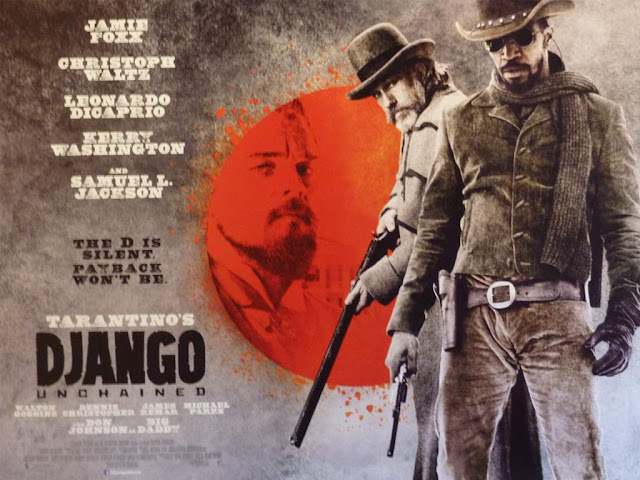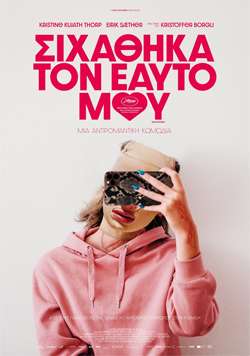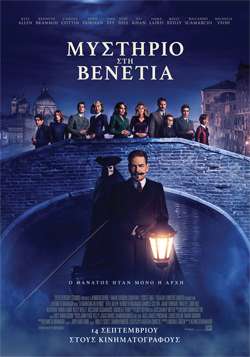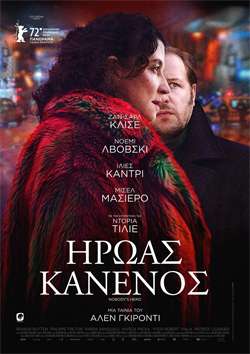Directed by Quentin Tarantino. With Jamie Foxx, Christoph Waltz, Leonardo DiCaprio, Kerry Washington, Samuel L. Jackson, Walton Goggins, Dennis Christopher, James Remar, Michael Parks, Don Johnson
Quentin Unleashed
by gaRis (@takisgaris) 
“No one can serve two masters. Either he will hate the one and love the other, or he will be devoted to the one and despise the other.” (Matthew 6:24)
This comes from an avid fan who really *gets it* Quentin; you may come up with innumerable alternate vigilantes-rewriting-history: The Jewish “Nazi-extermination squad” or the “Nigger Knight Rises” (pardon my French but, Variety counted this abominate word around 109 times during your inexcusably prolonged 165 min. incendiary saga) and…what’s next? May be the “Suffragettes’ Uncut”? Moving forward, this is not even my main argument/pain/frustration here. In fairness, P.T. Anderson will flip his father-son strained relations plot device over and over again and still produce authentically inspiring film artistry. We all know that you are a confessed fan of his and heaven knows a few people are living-breathing-gushing film the exhilarating way you do. So, let me serve this cold to ya, Quentin: You are being lazy, man.
Loosely adapting (D is silent)jango from the 1966 (directed by Sergio Corbucci) revenge spaghetti western staring Franco Nero (who shows in a brief cameo as a bar owner, watching a live black- men Mandingo fight on the couch, siting by slave owner Calvin Candie / Leo DiCaprio), Django Unchained is an effing salute to D. W. Griffiths’ Birth of a Nation (1915), prone to expose white men’s atrocities in the deep old (circa 1865) American South. Honestly, for the first 2 hours in, it feels like the real epicentre is actually the dentist -turned -bounty hunter and Django’s saviour/mentor Dr. King Schultz (Austrian Christoph Waltz who characteristically steals the show from anaemic Jamie Foxx’s Django, whose multiple cosplay simply does not deliver other than going through the motions). So much is the investment on Waltz by Tarantino that the only meaty female role is a black slave known by the name Brunhilda von SHAFT (get the reference?) who speaks German. Brunhilda (hilarious, eh?) is Django’s wife (Kerry Washington, reprising Foxx’s wife role from biopic Ray) and serves as an almost silent tapestry, depriving this masculinity overdosed flick by necessary feminine resonance. But hey, this is a Tarantino movie, right? As long as black slaves are getting graphically lynched by fierce dogs and white trash playing poker using slave’s extracted teeth it all works. It should work but it doesn’t really.
It’s a pity that Will Smith, with who in mind Tarantino originally wrote the script couldn’t get the role (he was filming M.N. Shyamalan’s After Earth). What nobody dares to mention, so I am willing to step forth, is the atrocious Quentin -the man- himself cameo at the key moment where Django is…Unchained. Like Shyamalan in Signs, bad acting finally finds its right connotation in the film lexicon. But, what the heck, this is supposed to be a revisionist parody, right? Yes and no. Although I can have this vulgar, acid and risibly bloodbath-ish any day over white man guilt- fuelled, lukewarm Lincoln, I yet strongly sympathise with Spike Lee’s Twitter denunciation of the film, for being not a good servant (pun intended) for the black emancipation cause. Tarantino’s grindhouse self-indulgence aside, there is enough great dialogue, especially involving Leo DiCaprio (who is remarkable again), who runs his slave Candyland farm with black –loathing cruelty paired with pretentious ignorance, portraying the epitome of the wealthy southern man. While DiCaprio, master of Brunhilda amongst numerous other intimidated black people in Candyland, has an intriguing affection for his chief servant Stephen, a negro-hater black who has an intense scene with Django that is nailed in memory, exploring an unchartered area regarding racial dynamics. Samuel L. Jackson, is fifth time’s a charm here as lame bigot Stephen and I could take oath on him snatching a supporting nod, if only there wasn’t a scene with Leo where he’s out of character for a tad bit.
Conclusion: Sally Menke (1953-2010) is so profoundly absent here. This is Tarantino’s first flick without her in the editing room and man it shows. Badly. Scenes are fluid, great sets and trademark shots all over the place. Even Big Daddie - KKK leader Don Johnson is super entertaining but, this being acknowledged, the film lacks cohesion and is stretching to serve its procured duality; a civil rights bloody manifesto in disguise and a tedious, bombastic unapologetic mayhem. Judging from my fellow reviewers’ response and witnessing its box office blooming, feels like a won bet in process. Tarantino has come a long way since his only true classics, namely Reservoir Dogs and Pulp Fiction. He is a hipster god and a film persona to behold for he has always been fresh, juicy and creatively provocative. I feel these elements are pushed aside here in the name of a self -congratulating kill-‘em-all mannerism which will indoctrinate many new adherents but will lose some old true believers. Collateral damages. There was a time some twenty years ago I felt a new Godard was born. Thank God(ard), Jean Luc is still alive and kicking.
Conclusion: Sally Menke (1953-2010) is so profoundly absent here. This is Tarantino’s first flick without her in the editing room and man it shows. Badly. Scenes are fluid, great sets and trademark shots all over the place. Even Big Daddie - KKK leader Don Johnson is super entertaining but, this being acknowledged, the film lacks cohesion and is stretching to serve its procured duality; a civil rights bloody manifesto in disguise and a tedious, bombastic unapologetic mayhem. Judging from my fellow reviewers’ response and witnessing its box office blooming, feels like a won bet in process. Tarantino has come a long way since his only true classics, namely Reservoir Dogs and Pulp Fiction. He is a hipster god and a film persona to behold for he has always been fresh, juicy and creatively provocative. I feel these elements are pushed aside here in the name of a self -congratulating kill-‘em-all mannerism which will indoctrinate many new adherents but will lose some old true believers. Collateral damages. There was a time some twenty years ago I felt a new Godard was born. Thank God(ard), Jean Luc is still alive and kicking.

World Premiere: 25 December 2012








